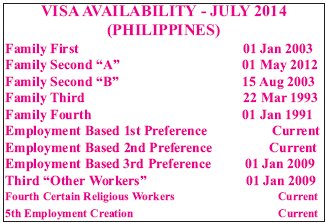
By: Robert Gard
Department of Homeland Security (“DHS”) Recently Published Two Proposed Rules Aimed at Attracting Skilled Workers to the U.S., Including, With Some Restrictions, Employment Authorization Eligibility for Some H-4 Dependent Spouses
According to DHS Deputy Secretary, Alejandro Mayorkas, the U.S. is engaged in a worldwide competition for talented entrepreneurs and highly skilled workers, and our immigration laws and regulations must change in order to keep this Country in the game, and at the top of the list of countries of destination for these sought after workers. While these proposed rules are not an adequate substitution for Congressionally stalled Comprehensive Immigration Reform legislation, they will improve our position in the global competition for entrepreneurs and skilled workers. The first proposed rule would allow for issuance of an unrestricted (as to employer) employment authorization document for H-4 dependent spouses of H-1B nonimmigrant workers who are already in the process of seeking lawful permanent residency (green card) through employment-based sponsorship/ petition.
To qualify, the principal applicant beneficiary must have been granted an H-1B extension under AC21 or an immigrant petition must have been approved for the H-1B principal applicant. In practice, this means the H-1B worker will have already been in the U.S. for six years in this status. Alternatively, the sponsoring employer would have to have completed its portion of the permanent residence process for the individual, which in my experience is not normally in the first years of the H-1B but more commonly when an H-1B is extended or nearing the six year maximum. In addition, a lengthy process must have been completed before the spouse can qualify for work authorization: a PERM Labor Department application must have been filed, which realistically takes six months to prepare; the PERM must then be certified, which will take months; the immigrant petition must be prepared and filed with USCIS, and USCIS must approve that petition—a process that currently takes four to six months, and has been known to take considerably longer. This therefore leaves thousands of H-4 spouses who won’t qualify under the new provision or who will likely need to wait years before they do. According to DHS Deputy Director Mayorkas, the changes would benefit as many as 97,000 spouses in the first year and about 30,000 a year after that.
Rather than extending employment authorization eligibility to all H-4 dependent spouses, DHS decided to limit this benefit to only those H-4 spouses where the principal employment-based beneficiary is clearly intending to stay in the U.S. on a permanent basis, and that process has already been started and successfully cleared several hurdles. The second proposed rule would “enhance opportunities” for highly skilled nonimmigrant workers and some immigrants by updating several existing USCIS regulations to: v H-1B1 (Chile and Singapore treaty-based H-1B visas) and E-3 (Australian treaty-based H-1B visas) in the list of aliens authorized for employment incident to status with a specific employer. • “Incident to Status” would clarify that H-1B1 (Chile and Singapore treaty-based H-1B visas) and E-3 (Australian treaty-based H-1B visas) Principal Beneficiaries (not dependent spouses) don’t have to apply separately to USCIS for Employment Authorization Cards. • Allow H-1B1 (Chile and Singapore treaty-based H-1B visas) and E-3 (Australian treaty-based H- 1B visas) and CW-1 (H-1B type visas for Commonwealth of Marianas employers to sponsor nonimmigrant workers) workers up to 240 days of continued work authorization (through their same petitioning employer) while they await adjudication of their pending extension of stay petitions. This “240 day” rule already applies to “traditional” H-1B beneficiaries, and this would extend that rule and benefit to these three specialty treaty-based H- 1B type cases.
Without the “240-day rule”, these special treaty-based beneficiaries had to apply for their extensions of stay several months before their expiration of authorized stay, and were required to stop working if their application for extension of stay was still pending at the time their existing authorized stay expired. This means that these individuals can continue to work with the specific employer listed in their petition, even after their authorized stay expires, as long as their extension petition is still pending. “Traditional” H-1B beneficiaries also enjoy the benefit of “dual intent”, whereby they are able to extend their H-1B visas and authorized stay even though they have shown a clearly expressed intention to seek permanent residency in the U.S. Unfortunately, DHS did not include a provision for extending the doctrine of “dual intent” to these treaty-based H-1B types of visas.
The proposed rules would also allow (intending) immigrants applying for employment based first preference {“EB-1”)visas for outstanding professors and researchers to establish and prove their academic achievements and outstanding qualifications through a broader selection of evidence and factors that do not exist in the current regulatory list for that purpose. The proposed rule broadens the acceptable list of evidence which must be submitted to establish eligibility for this type of visa to include “comparable” evidence.
The current EB-1 regulations do not allow petitioners for outstanding professors and researchers to submit evidence that the beneficiary is recognized internationally as outstanding in a specific academic area such as, in certain circumstances, important patents or prestigious peer-reviewed funding grants. This rule proposes to modify the regulatory limitation on initial evidence for outstanding professors and researchers to allow a petitioner to submit evidence that is comparable to the list of currently accepted evidence and that demonstrates that the beneficiary is recognized as outstanding. The new regulatory criterion for initial evidence would be similar to those found under the aliens of extraordinary ability and the aliens of exceptional ability classifications. This would broaden the range of evidence that professors and researchers may submit and therefore provide petitioners with an opportunity to present additional or alternative documentation demonstrating the beneficiary’s achievements if the evidence otherwise described in 8 CFR 204.5(i)(3)(i) does not readily apply. USCIS will issue final rules after the 60-day comment period is over (soon after July 11, 2014) and USCIS has addressed the comments received during the comment period after the publication of the proposed regulatory changes.
Republican Congressman Introduces Legislation in the House that Would Allow Young Undocumented Immigrants Brought to the U.S. as Children to Apply for Citizenship after Military Service
Each year, roughly 8,000 immigrants join the U.S. military, bringing linguistic skills and cultural diversity that enrich each branch of the Armed Forces. Nearly 65,000 service members have become naturalized U.S. citizens since September 2001, but there are still limits that prevent young immigrants who want to serve from doing so. In addition, there are a growing number of veterans of the U.S. military who served honorably but have still found themselves deported due to our broken immigration laws. In the case of young people with Deferred Action for Childhood Arrivals (DACA) who want to serve their country but are prevented by their status, proposed measures could help chip away at these barriers, but so far, leaders in the House of Representatives have blocked attempts at reform.
(R-CA) offered his ENLIST Act, which would allow undocumented immigrants to enlist in the armed forces if they entered the U.S. before they turned 15 and have been continually present since. Only those otherwise eligible to join the armed forces could enlist. While serving in the military, unless they received a dishonorable discharge, they would be authorized to become legal permanent residents, setting them up to eventually apply for citizenship. The bill was co-sponsored by Rep. Tammy Duckworth (D-IL).
The bill was offered as an amendment to the National Defense Authorization Act (NDAA). Similarly, Rep. Joaquin Castro (DTX) proposed an amendment that would have allowed undocumented immigrants to attend the military service academies. The House Rules Committee voted against allowing floor votes on either amendment during the NDAA debate. However, despite these failed amendments, it was reported that the Pentagon is already considering allowing immigrants with work permits through DACA to serve. House Speaker John Boehner has indicated that he would not rule out a floor vote on the ENLIST Act, a proposal to let some unauthorized immigrants obtain legal status in exchange for military service. Republican Rep. Jeff Denham of California offered it Monday as an amendment to a defense authorization bill, an approach rejected by GOP leaders. Boehner said the defense bill seemed “an inappropriate place” for the measure, but it could be weighed as a stand-alone bill.
Rep. Steve King (R-IA), one of the most vocal anti-immigrant voices in Congress couldn’t resist the temptation to take a shot at the ENLIST Act. On the floor of the House, King launched into this tirade: “This bill, this badly named ENLIST Act, would put out the advertisement that says, sneak into America, sneak into the military and that’s going to be the most expeditious path to American citizenship and the whole smorgasbord of benefits that come from American citizenship,” he said. “Citizenship must be precious, not handed out like candy in a parade. We don’t ride along and throw out citizenship like you do M&M’s or Tootsie Rolls or whatever it is we’re tossing out in our parades.”
The message of obstructionism from Rep. Steve King and House leadership (Speaker Boehner and Rep Eric Cantor, House Majority Leader, is very clear. Even if you are willing to put your life on the line for your adopted country, these political “leaders” don’t want you here.
Quick Notes
President Obama has Delayed a Review of Deportation Policies Until after the Congressional Summer Recess to Give More Time for Congress to Work Out a Deal on Comprehensive Immigration Reform (“CIR) Apparently, President “Charlie Brown” Obama wants to take another proverbial run at the bipartisan “football”, so President Obama has instructed Homeland Security Secretary Jeh Johnson to continue his review of deportation/removal policies, but the results will not be announced before lawmakers take their summer recess in August. The White House is concerned that Republicans would balk if the administration takes unilateral action to stem the deportation of undocumented immigrants, ending any slim remaining hopes of a legislative compromise. Congressional Republicans have not, so far, shown any inclination to embrace immigrants, much less provide a legislative victory to the Obama Administration, so it’s difficult to understand why this President keeps looking into the dry well of bipartisanship, imagining that something will miraculously appear. COPYRIGHT BY AUTHOR — 2014
This article is designed to provide accurate and authoritative information in regard to the subject matter covered. It is published and distributed with the understanding that the publisher is not engaged in rendering legal, accounting or other professional service. It is submitted for publication by the author with the understanding that each individual case is different, and this article is not a formal legal opinion and should not be relied upon as advice by the author in a particular legal situation. Mr. Gard has been engaged in the practice of immigration law since 1977. He is a frequent writer and lecturer in the American Immigration Lawyers Association and has served that professional organization as a Chapter Chair of the Greater Chicago Chapter, and as a Director. Written questions may be submitted to Mr. Gard. At his discretion, selected questions or issues may be addressed in subsequent articles. Mr. Gard is available for appointments for consultation in immigration law-related matters at the law offices of Immigration Attorneys, LLP, 203 North LaSalle Street, Suite# 1550, Chicago, Illinois 60601, Contact Information (email is the preferred method of contact): e-mail: rgard@immattyllp.com
 VIA Times – June 2014 Issue Vital News, Vibrant Views for Asian Americans in Chicago & Midwest
VIA Times – June 2014 Issue Vital News, Vibrant Views for Asian Americans in Chicago & Midwest




